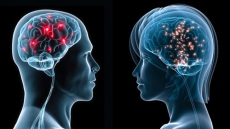Ever wondered why a particular medicine is effective for certain people but not for others? That is largely decided by genes, research reveals.
Researchers have provided unprecedented insights into how genetic variants influence complex disease and drug response through metabolic pathways.
The team has linked 145 genetic regions with more than 400 molecules involved in human metabolism in human blood.
This atlas of genetic associations with metabolism provides many new opportunities to understand the molecular pathways underlying associations with common, complex diseases.
"This work provides an important new window into the genetic variation underlying human metabolism," said Eric Fauman, study co-author and research fellow from Pfizer Inc.
Metabolic molecules, known as metabolites, include a wide range of different molecules such as vitamins, lipids, carbohydrates and nucleotides.
They make up parts of, or are the products of, all biological pathways.
This new compendium of associations between genetic regions and metabolite levels provides a powerful tool to identify genes that could be used in drug and diagnostic tests for a wide range of metabolic disorders.
“This database will facilitate drug discovery for metabolic disorders and also help researchers to understand the biology behind disease,” said Gabi Kastenmuller, co-senior author from the Helmholtz Centre Munich, German.





